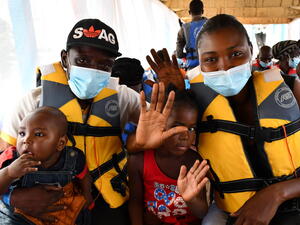Eritrean repatriation from Sudan resumes
Eritrean repatriation from Sudan resumes
UNHCR and the governments of Sudan and Eritrea are scheduled to resume tomorrow (Saturday) a massive return operation aimed at bringing home more than 160,000 Eritrean refugees, many of whom have been in exile since the late 1960s. A 20-truck convoy carrying more than 200 Eritrean returnees is expected to leave Saturday from Shagarab camp, south-west of the town of Kassala on Sudan's eastern border with Eritrea. The returnees will be transported to a transit centre in the western Eritrea town of Tesseney for an overnight stay. Eritrean authorities will register the returnees and provide basic mine-awareness information before transporting them to their destinations of choice.
Some of the refugees, who have lived in exile for decades, have no homes to return to. Local authorities will give families up to two hectares of arable land to aid their reintegration. In addition, every family will receive a cash grant as well as a two-month food package, household supplies and agricultural tools.
The operation, which began in May this year, was suspended in early July after heavy rains completely cut off some roads from camps in eastern Sudan. In addition, the Gash Barka region of western Eritrea - destination for the majority of returning refugees - was hit by floods. By the time the operation was suspended in early July, UNHCR had assisted nearly 21,000 refugees to return home.
Nearly 15,000 refugees in seven sites have so far signed up for repatriation. These figures include 1,900 refugees in the Port Sudan area, where there are an estimated 4,000 refugees who will be assisted home by sea. Registration for return will be expanded to seven new sites, which have so far not been targeted. In addition to returns so far this year, UNHCR expects to aid the return of another 40,000 refugees before the end of the year to reach a target of 62,000 voluntary returns during 2001. The repatriation and reintegration of these long-term exiles is planned to continue until December of next year, ending one of UNHCR's longest-running refugee situations.








